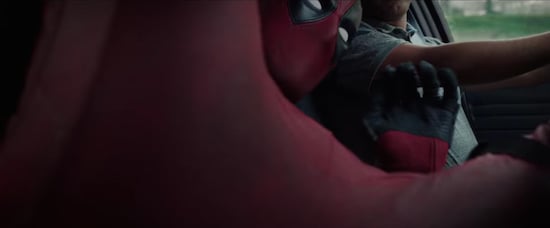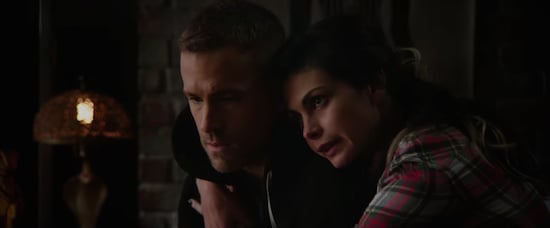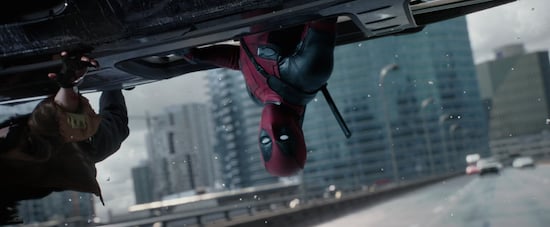THIS: Not Safe for World
By:
March 7, 2016

Mass-murder porn is the pastime of all crumbling empires. Making entertainment, and making jokes, of the damage a sick society does is a secure callus on the conscience. The Top Gun/Rambo phase of Reagan-era pop culture is one such canon, and strains of it continue in the disaster-porn of the present day, though our military fantasies have gotten a lot more self-doubting.
Deadpool is a literally-callused character — a former contract-thug scarred and scorched head-to-toe from shadowy experiments that saved his life (as a terminal patient with no options left) while giving him super-regenerating cells which let him withstand any battle-wound, however cartoonish — and not including, for some reason, his scarred and scorched skin, but I guess the latter serves a Dorian Gray purpose, as he seeks to continue his career as a high-paid mercenary.
The narrative diagnosis feels fitting, since Deadpool’s condition makes his brain cells grow too rapidly too, producing both comical mental instability and such a hyper-awareness that he perceives the audience reading his comics or watching his new movie. In those comics, he always struck me as a remnant of the not-funny comic-relief PTSD-vet character that was another staple of Reagan-era mass-murder porn (see: The A-Team). In the movie, though, he is pitched perfectly as a trickster figure whose mania embodies and rebukes the absurdity of the carnage we’re being marketed. The program he escaped from, after all, was designed to produce mindless rental-warriors for global conflicts — he may be fighting all the time, but he’s left the army now.

The movie mostly consists of him trying to track down the sadistic scientists who made him what he is today, to whom we follow a trail of bodies with him. His repeated loss of limbs that grow back, survival of Looney Tunes perfect-circular see-through wounds, etc., give us reason to reflect on how many times the same strategy needs to blow up in someone’s face; this is post-imperial pop that has its explosions and walks away from them too, since it is having a laugh about its callousness, not because it’s callous.
Those laughs are non-stop; a wartime artifact like Frank Miller’s Holy Terror graphic novel merely sets a contemporary standard for coarse and cruel, whereas Deadpool is relentlessly inventive with its choreography of carnage and the wordplay of its vulgar ridicule. We don’t see many innocent bystanders harmed, but the ridicule itself is an indiscriminate weapon — no one escapes it, least of all the jester antihero. Xenophobia is nil; Deadpool’s closest-thing-to-a-bro is a wry and unflappable Indian cabdriver he bonds with and advises badly (played by Karan Soni), and his other, um, bro is the old lady he holes up in a crackhouse with (Leslie Uggams, in an Oscar-worthy exhibition of hilarious self-possession as “Blind Al” to match Ryan Reynolds’ gourmet humiliation in the title role).
Sexism is in refreshingly short supply too. Vanessa (Morena Baccarin), Deadpool’s love interest in both his post-human state and his technically-human past, is a match for dive-bar harassers and supervillains alike, but with real-life confidence, not videogame/fetish badassery, and is allowed sexual appetites equal or greater than the male lead while being portrayed as entirely goodhearted and healthy. Except for the, y’know, being-in-love-with-a-contract-killer part, but one of the film’s strengths is its nonexistent pretense to innocence. Denial of his “heroism” or even the idea of it is a repeated refrain from the title character, and the marginal occupations of even the more sympathetic characters (Vanessa’s strip-club bartending job, Dopinder the cab-driver’s apparently 24-hour shift) are a spectrum of post-(hmm)superpower America. We all know that our military flailings are nothing to be proud of anymore, and our economic system is propped up by overseas slavery, and 99 percent of us aren’t lookin’ so good ourselves, so virtue is not possible, though basic kindness is, and a strange tenderness survives between Deadpool and his small support structure. Unlike the common costumed vigilante movie, this mercenary murder-comedy is remarkably without judgments.

Commentators (both feminist fangirls and refreshingly self-aware nerd-boys) have already questioned Vanessa’s eventual damsel-in-distress position, though in this case I feel the trope may have had to be saved to be killed. We see the pre-Deadpool “Wade Wilson” step in to defend Vanessa against a barfly’s advances when she doesn’t need him, then fail her in an abduction by his enemy when she does; the first time, he’s being egotistically chivalrous, the second, he’s being self-servingly vain (worrying about how his scarred face will look to her because she hasn’t seen him since the experiment). We root for her to come through while, in older times, we just would’ve been expected to cheer for the “hero” to regain his “prize,” and seeing things from her perspective, we get a sense of the endangerment that male mayhem leaves in its wake (and ahead of it, and on both sides). This may still mean that, rather than getting fridged to “further the male’s character development,” she gets threatened to point up the male’s stuntedness, so, yeah, hopefully a trick they’ll be smart enough to use only once; almost every other super-flick has recently done without it.
If any movie can take the hint from its viewers, it’s Deadpool. While (as I’m far from the first to point out) there’s nothing new about the film’s “fourth-wall-breaking” — with universal internet leaks and comments-thread hegemony, the fourth wall had been carted away in rubble by the start of this century — what’s new about this movie is the feeling that it’s not only self-aware but responsive to us. The weird seepage of techniques from martial-arts flicks, kids’ cartoons and more make it a kind of ultraviolent Annie Hall; its moral blurs and appealing transgression make it the nearest thing to an American Danger: Diabolik — neither of which would be unlikely material for the protagonist’s frequent patter of free-associated but strangely pertinent pop-music and film-studies references.

Deadpool is lauded as a deconstruction of what has come to be familiar as the typical superhero movie, but that’s not quite it either — these movies tend to self-deconstruct as they go along. For all its surprisingly layered, stealthily smart implications, this is decidedly not a “commentary” on violence or a hand-wringing critique of absolute power. It’s enough that it is an unblinking observation of those things. To fully observe, you may need to jump in, and while there, you might as well find some enjoyment, accepting on both cautionary and sensory levels that it’s always funny until somebody loses an arm, and it grows back, and gets shot off again.
Deadpool is not the hero that anyone deserves, but this may have been the superhero film we needed — that rare example of fantasy without illusion.
Special thanks to Adam Swiderski and Cher Martinetti of blastr’s Who Won the Week podcast.
MORE POSTS by ADAM McGOVERN: OFF-TOPIC (2019–2025 monthly) | textshow (2018 quarterly) | PANEL ZERO (comics-related Q&As, 2018 monthly) | THIS: (2016–2017 weekly) | PEOPLE YOU MEET IN HELL, a 5-part series about characters in McGovern’s and Paolo Leandri’s comic Nightworld | Two IDORU JONES comics by McGovern and Paolo Leandri | BOWIEOLOGY: Celebrating 50 years of Bowie | ODD ABSURDUM: How Felix invented the 21st century self | CROM YOUR ENTHUSIASM: C.L. Moore’s JIREL OF JOIRY stories | KERN YOUR ENTHUSIASM: Data 70 | HERC YOUR ENTHUSIASM: “Freedom” | KIRK YOUR ENTHUSIASM: Captain Camelot | KIRB YOUR ENTHUSIASM: Full Fathom Five | A 5-part series on Jack Kirby’s Fourth World mythos | Reviews of Annie Nocenti’s comics Katana, Catwoman, Klarion, and Green Arrow | The curated series FANCHILD | To see all of Adam’s posts, including HiLo Hero items on Lilli Carré, Judy Garland, Wally Wood, and others: CLICK HERE
